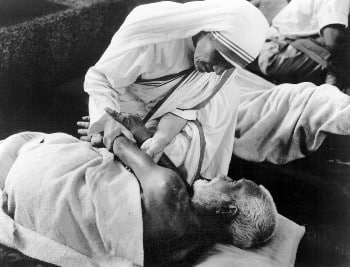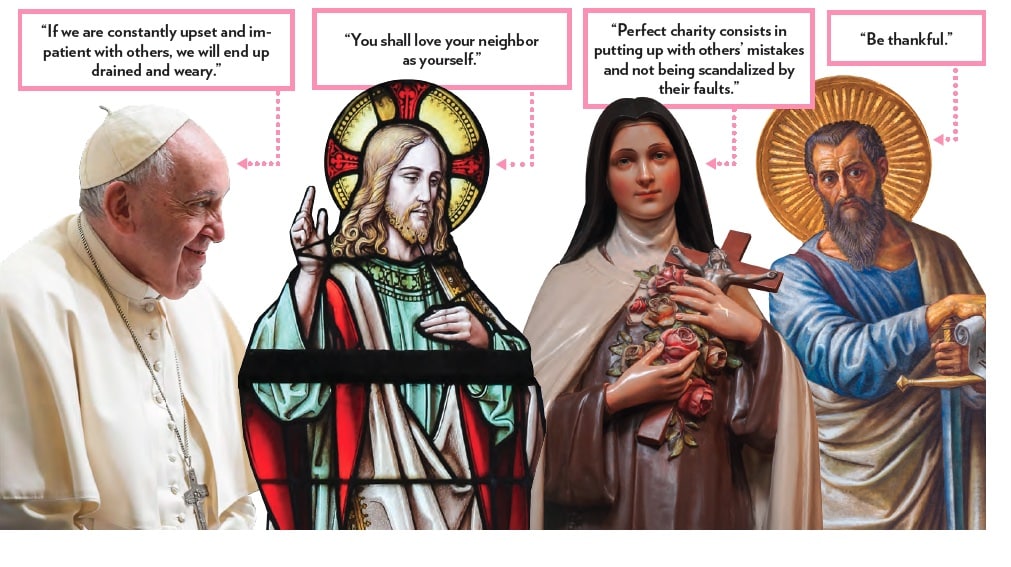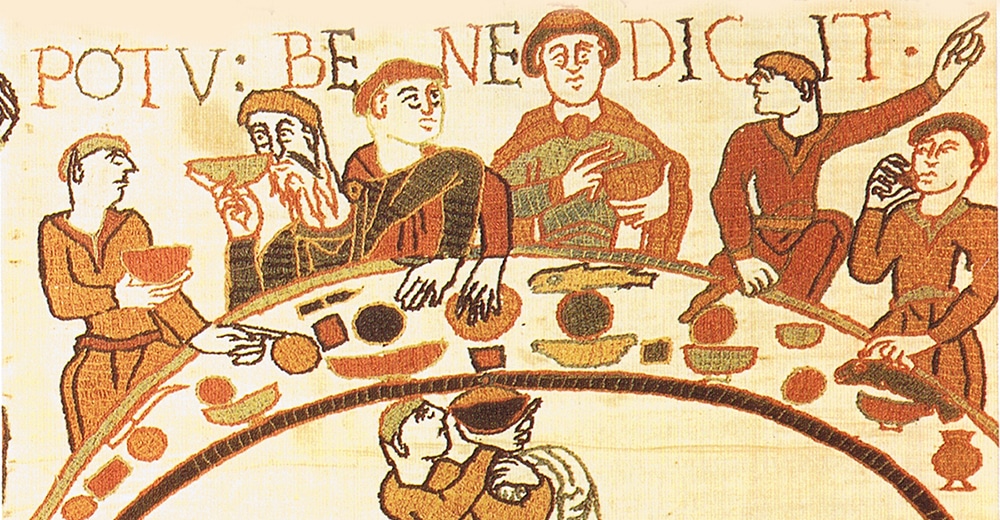It’s not too late to make a New Year’s resolution (or to start preparing for Lent). How about a new dress code? Today, dress codes seem to have gone the way of the landline phone. Casual Friday has become the norm for every day. People show up at weddings in blue jeans. Nurses wear T-shirts instead of smocks. Doctors rarely wear the traditional white coat. And, for many, dressing up for Sunday Mass is a thing of the past. No one wants to be told what to wear anymore.
The disappearance of dress codes is not necessarily a bad thing. It can remove the burden of excessive clothing purchases for many people. However, there is one dress code that Christians should never ignore. It comes from St. Paul’s Letter to the Colossians:
“Put on then, as God’s chosen ones, holy and beloved, heartfelt compassion, kindness, humility, gentleness, and patience, bearing with one another and forgiving one another, if one has a grievance against another; as the Lord has forgiven you, so must you also do. And over all these put on love, that is, the bond of perfection. And let the peace of Christ control your hearts, the peace into which you were also called in one body. And be thankful” (Col 3:12-15).
Often, a dress code’s purpose is to make sure we project a good image. That is why St. Paul’s nine virtues are so important. They have a natural attractiveness that is way beyond any impression a stylish dress or shirt might offer. Virtues help us glow in a way that is pleasing to others and, more importantly, to God. They are not only appropriate but also right for any and all situations. When we are well dressed, we feel good. We look in a mirror and like the image we see. In the same way, we will like ourselves better when we wear these virtues.
When we are clothed in these virtues, we can attract others to our faith much more than we could with preaching and arguments. People will want to know our God not because of how we argue with them, but because of how we treat them. They will want to know where we shop for our peace and love. In other words, wearing these virtues can lead others to Christ.
When we are well dressed, we feel good. We look in a mirror and like the image we see. In the same way, we will like ourselves better when we wear these virtues.
Sadly, with the decline in faith, these virtues are often in short supply. People once lived these nine virtues because they knew it was what God expected. Take God out of the picture and it does not take very long before people think only of themselves and do only what they believe is best for them. Today we are seeing what happens when people demand that God be silent.
Mark Twain once said, “Clothes make the person. Naked people have little or no influence on society.” Just like clothes, our virtues can have an influence on others. The Catechism of the Catholic Church says a virtue “allows the person not only to perform good acts, but to give the best of himself” (No. 1803). Our world, today, certainly needs the good influence of virtues. It needs the best of us! Why not try these nine on for size — maybe concentrating on a different virtue each day — until you have the perfect look.
Compassion
 Compassion can be uncomfortable. The very word means to “suffer with.” Though we would prefer to look the other way, compassion calls us to see and to feel the wrong. When we show compassion, we don’t just go on with our lives. Like the Good Samaritan, we cross the road and pick up the one who is wounded. We personally offer help and care.
Compassion can be uncomfortable. The very word means to “suffer with.” Though we would prefer to look the other way, compassion calls us to see and to feel the wrong. When we show compassion, we don’t just go on with our lives. Like the Good Samaritan, we cross the road and pick up the one who is wounded. We personally offer help and care.
We like to imagine God safely protected in the gold tabernacle before which we reverently bow. Compassion, however, calls us to see God hiding in the drunken neighbor, the grimy street person, or the badly disfigured patient in the nursing home. All these ignored people are essential parts of the jigsaw puzzle of God’s world. If even one of them is lost, the complete puzzle is flawed. God’s eye keeps going to that one place where a piece is missing. The more we ignore the hurting pieces of our world’s puzzle, the more ruined the entire picture will be.
To be compassionate we must follow the example of St. Francis, who reached out to touch the leper that repulsed him. A compassionate person gives not what they want to give, but what the other person needs. This is not easy. But it is what makes saints of ordinary people.
Kindness
Be kind. Just a short little word. It seems like such a basic virtue. Something every child is taught to do. Kindness is just a matter of thinking of someone else first. It only takes a few minutes to be kind. To allow someone to go ahead of us in traffic or a checkout line. To smile or say “thank you.” Kindness is a soft and gentle giving of something that is not expected or required. Kindness makes us better people, but more importantly it is about making the day better for someone else. Our kindness may only touch someone for a brief moment or it may have the power to change a life forever.

Yet, it is not always easy to wear kindness. It was okay to be kind as a kid, but it is just not convenient for us very busy adults. It is like a shirt we have outgrown. It just does not feel comfortable anymore. But we must never outgrow kindness.
Mother Teresa once said, “Kind words can be short and easy to speak, but their echoes are truly endless.” Not only will we never know the far-reaching impact our kindness may have on others, but we do not realize the great benefit it can have for us. Just taking a few minutes to smile and be kind can change our whole attitude. It can make our step lighter and our smile brighter. Why? Because our kindness has a beautiful and cleansing effect on our own souls. So, let’s be kind today!
Humility
St. Francis de Sales said it is easier to be humble if we remember “none of the good in us comes from us.” He sees us all as God’s mules. A mule, de Sales wrote, was not better because it carried a load of jewels. The mule who carried a bundle of old sticks was just as good. Speaking of the gifts God has packed into our lives, de Sales asked, “What good do we possess that we have not received? And if we have received it, why do we glory in it?” We must always remember God alone gets the credit for the graces in our lives. This is humility.
We think it is impressive to be impressive, yet it is often those who are most humble who are most liked and respected. If we try to be seen as wiser or better than others, most people — like Dorothy did in Oz — will see behind the noise, smoke and curtains. Sirach tells us, “Conduct your affairs with humility, and you will be loved more than a giver of gifts. Humble yourself the more, the greater you are, and you will find mercy in the sight of God” (3:17-18). Ironically, humility is a virtue that brings us the honor we could never gain without it.
Public domain and Adobe Stock images
Gentleness
We may think of gentleness as a weakness. Yet, gentleness is a noble virtue. Only a very good and strong person is called a “gentle” man or “gentle” woman. It is easy to be harsh, rough or abrasive. It takes much more effort to be gentle.
Since gentleness does not come easy, we must practice it on ourselves, before we will be able to be gentle with others. If we overload ourselves with obligations or if we judge ourselves harshly, we will probably treat others in the same demanding way. Walking with gentleness means letting go of the expectations that can be a heavy burden for ourselves and for others.
Gentleness is also a virtue that prepares us to enjoy heaven. If we do not learn on earth how to sit quietly and relish the peace and glory of God, we might have a difficult time in heaven. Our own personal purgatory could be learning how to enjoy the quiet calm and goodness all around us. Wouldn’t it be better if we learned that on earth, so that we won’t have to waste precious time outside the gates of heaven learning how to put on gentleness?
Patience
Patience is being able to wait for the good. Hope and trust are woven into the fabric of patience. To live with patience, we must trust that God is holding great gifts for us that we will receive at a future time.
Patience helps us tolerate the many imperfections sin lets into our world. When we see each annoyance in life as just a stepping stone to heaven, we draw so much closer to God. Likewise, we will be more patient with others if we start to think of them as the one who might be there to open heaven’s door for us on the day we arrive. After all, we would not want to turn our backs on this gatekeeper because we have no patience for them!
In his apostolic exhortation Gaudete et exsultate (“On the Call to Holiness in Today’s World”), Pope Francis tells us, “If we are constantly upset and impatient with others, we will end up drained and weary” (No. 72). The pope goes on to say, “stop wasting our energy on useless complaining.” The patient person does not complain! Instead, let us live by the words of St. Thérèse of Lisieux: “Perfect charity consists in putting up with others’ mistakes and not being scandalized by their faults.” This is patience!
Forgiveness
Forgiveness is a difficult virtue to wear. It is just not easy for us to forgive. Perhaps some of the scariest words we pray each day are the words from the Our Father, which say, “forgive us our trespasses as we forgive those who trespass against us.” Which literally means if we are not able to forgive others, then we understand God may not forgive us, either.
Pope Francis has said, “One cannot live without seeking forgiveness, or at least, one cannot live at peace. … We wrong one another every day.” Our hearts just cannot hold all the anger and grudges we accumulate throughout our lives. It is much easier to just let it all go. Sadly, it is often true that when we carry a grudge, we are more tied up in knots than the person we cannot forgive. In fact, the other person may be going through life blissfully unaware of our bitterness. Yet, the anger is destroying our own soul.
The virtue of forgiveness is certainly not an easy one. However, not forgiving can be like wearing tight and uncomfortable hard-soled shoes. But when we truly forgive, it is like slipping into a pair of soft, fur-lined slippers. At the end of the day, it just feels so good to let go of the pain and discomfort of our anger.
Love
 Love is not an optional accessory garment for us. Jesus commands that we always wear love. He says: “You shall love the Lord, your God, with all your heart, with all your soul, and with all your mind. This is the greatest and the first commandment. The second is like it: You shall love your neighbor as yourself” (Mt 22:37-39).
Love is not an optional accessory garment for us. Jesus commands that we always wear love. He says: “You shall love the Lord, your God, with all your heart, with all your soul, and with all your mind. This is the greatest and the first commandment. The second is like it: You shall love your neighbor as yourself” (Mt 22:37-39).
Love of God and love of others are forever intertwined since God dwells in all of us. With every person we meet, God is silently asking us, “Can you love me in this one?” Modern theologian Karl Rahner calls love of others, “the one convincing” part of Christianity. We give witness to the existence of an all-loving God when we show a gentle love for other people. It is the attire that sets us apart as Christians. People can more easily believe God exists when they experience our love rather than our criticism.
Yet, love is perhaps the most delicate of all the virtues. It is like fine lace. It can so easily be destroyed. To maintain it, we need quiet time to feel God loving us. That love from God will give us the strength to love others.
Peace
By living St. Paul’s first seven virtues, we naturally begin to find more peace in our lives. Peace is like our crowning glory, a royal cape that covers us from the rains of life, just as Jesus protected the disciples during the storm at sea. Pope Francis tells us, “Building peace is a craft that demands serenity, creativity, sensitivity and skill” (Gaudete et exsultate, No. 89). Peace will only settle into our hearts when we silence all that is angry in our minds.
We know peace when we accept that God is in control and all will work out just as it is meant to be. It is said that worrying is an insult to God. Yet, today our world is full of anxiety. We do not know how to calmly surrender to God’s will. St. Thérèse of Lisieux warned, “It is such a folly to pass one’s time fretting instead of resting quietly on the heart of Jesus.” To have peace, we each must find our own way to nestle against Our Lord’s heart and feel that all is well.
Gratitude
St. Paul ends his list of virtues with two simple words. “Be thankful.” God pours so many blessings into our lives. Yet, we often take them for granted. Our expectations in today’s world are completely out of control. We are destroying life on this planet because of all that we want. Gratitude calls us to stop this endless wanting. We must, instead, open our eyes to the great gifts God has already given us.
Christian writer G.K. Chesterton says, “The test of all happiness is gratitude.” Yet, he laments that “Modern man has utterly lost the joy of life.” We have become like hungry birds at a feeder — pushing and knocking others out of the way just to get what we want, never pausing to be thankful for what we have been given.
We have given up our joy in life because we are always expecting something more. It is that constant wanting — that pushing others aside to get what we want — which can also prevent us from practicing St. Paul’s other virtues. When we are grateful, we find time to be good to others. When we are not grateful, we fail to be good to ourselves or to others. We just push too hard and complain too much.
Dressing for success
Our Lord’s last words to us were, “Go, therefore, and make disciples of all nations” (Mt 28:19). Today, Jesus still begs us to go out as workers in the mission field. St. Paul has told us what uniform we must wear for this work. Virtues must be our “forever” attire. Virtues are not something we do once and then check off our to-do list. We cannot approach God and proudly say, yes, I was gentle the other day. I forgave someone three months ago. I was kind to a stranger in 1997. These virtues are something we must practice every single day. We should wear them like a tattoo or a treasured piece of jewelry — not as an overcoat that we can throw on or off depending on the weather of our heart.

We lament the loss of faith in our world. But maybe it is our own fault. Maybe, it is because we fail to dress in the virtues that will make us attractive to others. We judge when we should forgive. We are harsh when we should be gentle.
Since we cannot give what we do not have, it is important that we practice these virtues toward ourselves first before we try to give them to others. It is not selfish for us to show ourselves compassion, kindness, humility, gentleness, patience, forgiveness, love, peace and gratitude. In fact, it is exactly what God calls us to do. Because God dwells in us as much as he dwells in all others, it is good and holy for us to treat ourselves with virtue. The United States Catholic Catechism for Adults calls St. Paul’s list of virtues, “A practical plan for holiness.” We need to take seriously the call to be people of virtue, for without virtue it is impossible to live as Jesus calls us to live.
These are not easy virtues to wear. They are all woven together. We cannot pick and choose which ones we want to practice. We cannot put them on without the help of daily prayer. The prayer below might be one simple way to find the grace to dress every day in all these beautiful virtues.
Susan M. Erschen writes from Missouri.
| A morning prayer for dressing |
|---|
| There is an ancient Buddhist practice known as the metta meditation. Sitting quietly and breathing deeply, the person asks day after day for the personal qualities they wish to have. This ancient prayer can be baptized as a prayer for the virtues St. Paul tells us to wear. By praying to Christ for the virtues listed by the apostle in the New Testament, it can be our morning dressing prayer, said as we get ready to face each new day. It is a simple way to remind us of the virtues we are called to wear and to ask God to help us live them fully throughout the day.
Dear Lord, |









